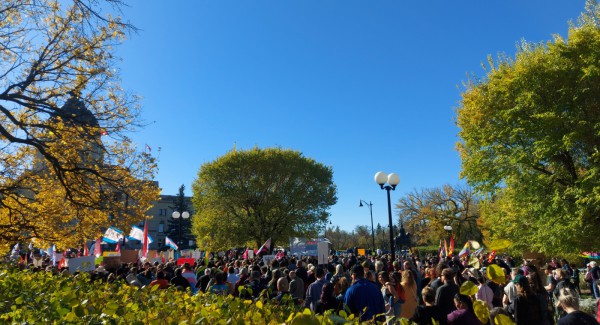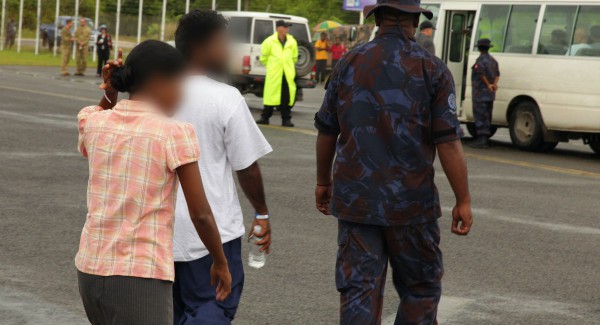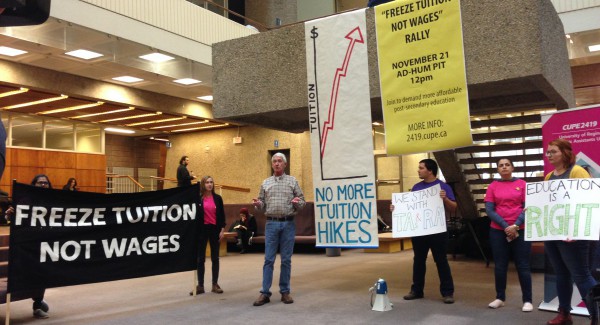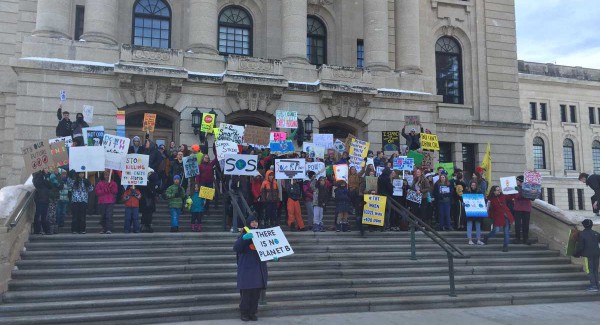Students call on the UofR to freeze international students’ tuition
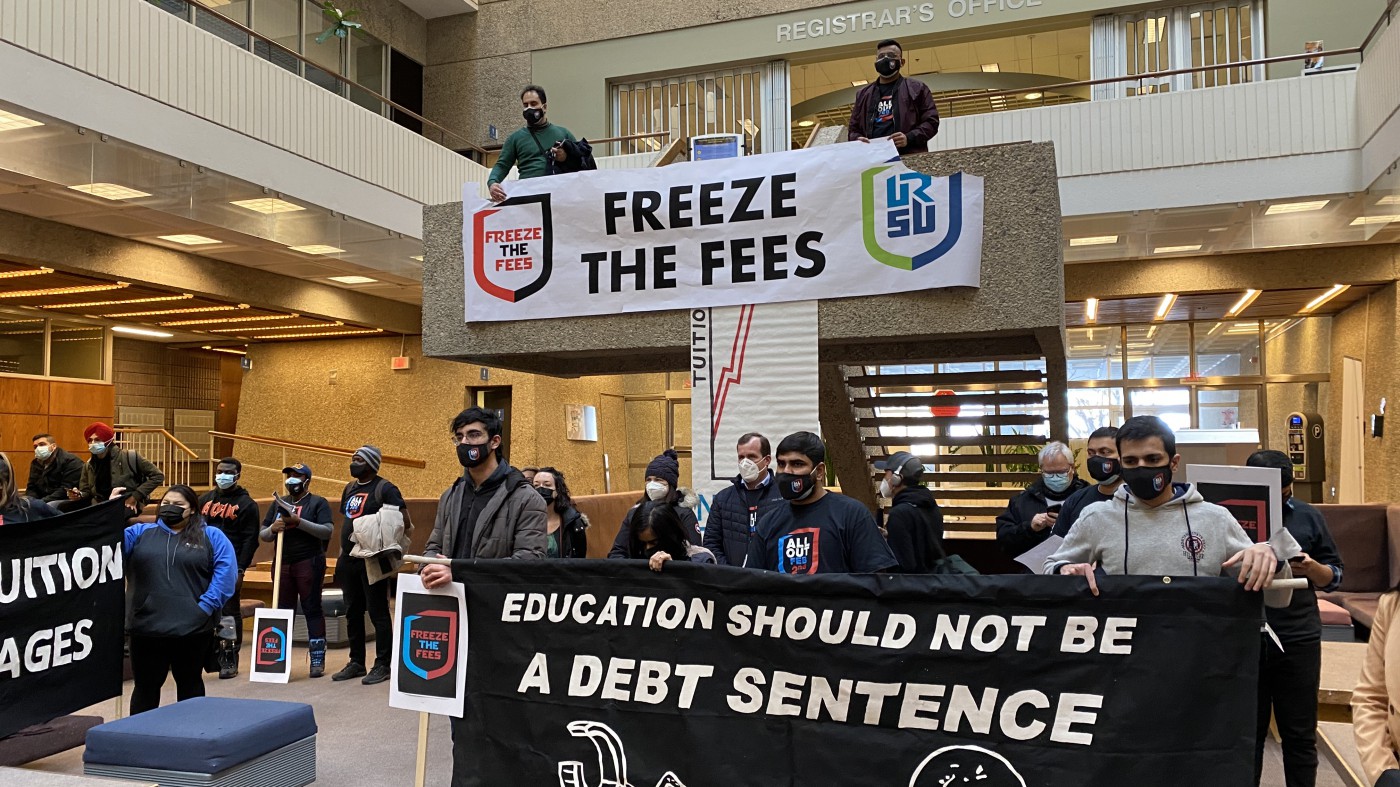
Students and supporters gather in the Ad-Hum Building to protest, holding vibrant signs and chanting. Photos courtesy of Neil Petrich.
In 2021 the University of Regina Students’ Union (URSU) voted to launch a “Justice for International Students” campaign, and dedicate resources to addressing international students’ issues – from high tuition to racism to the threat of deportation. On February 2, URSU held a rally calling on the university to freeze tuition fees – and while similar rallies have been held at the University of Regina before, this was the first that focused specifically on international students’ tuition.
At the UofR, undergraduate domestic students in the Winter 2022 semester pay, on average, $1,014.81 for one course. In the Winter 2021 semester, the average tuition for one course was $877.46. That’s a 15 per cent increase between 2021 and 2022 – far higher than the national average increase of 1.7 per cent.
Now imagine having to pay over double that amount while only being able to work a limited number of hours. That’s what roughly one in six UofR students face.
This year, the average international student course at the UofR costs $2,511.14, an astounding 147 per cent more than domestic students pay. All told, international students enrolled in a full course load end up having to pay well over $20,000 per year.
International undergraduate student Harveer Singh is enrolled in the Faculty of Business Administration, which at $2,734.95 per class and $12,715.95 for a full course load per semester is the most expensive faculty for international undergrad students. To make ends meet, he works 60 hours per week – 40 on campus as an URSU executive and 20 at a part-time job off campus. The bulk of what he earns goes directly to paying tuition, and most of the rest goes to rent and utilities. With his work days beginning at 9 a.m. and ending at 8 p.m., he tells me he finds it profoundly difficult to balance his professional, academic, and personal lives while keeping his mental health and stress levels in check.
“Imagine a domestic student and an international student going out for a cup of coffee,” Singh says. “They both order the same item, but the latter is charged nearly triple the price the former pays. Why does one have to pay so much more for the exact same item?”
Singh is able to work 60 hours a week because, as an on-campus employee, he is exempt from the work restriction that applies to international students. According to federal law, international students are only allowed to work up to 20 hours per week off campus. The law further stipulates that international students must be enrolled full-time to work, meaning that if they need to work then they have no choice but to pay the university’s exorbitant fees for not one but three courses each Fall and Winter semester.
Many international students find part-time work off campus, but they rarely make over minimum wage – which, in Saskatchewan, is a meagre $11.81 per hour and is the second-lowest in the nation – let alone a livable wage, and there is never any guarantee that they will be scheduled for the full 20 hours per week. Many resort to working under the table, which comes with the risk of deportation. In 2019 Jobandeep Sandhu, an international student from Punjab, was arrested and deported after working full-time as a truck driver to afford tuition at Canadore College in Ontario.
“Imagine a domestic student and an international student going out for a cup of coffee,” Singh says. “They both order the same item, but the latter is charged nearly triple the price the former pays. Why does one have to pay so much more for the exact same item?”
This sense of frustration pervaded the rally on February 2, where roughly 50 students marched through campus and then gathered in the Administration-Humanities Building with picket signs. Chants of “freeze the fees” and “the people united” echoed loudly through the halls. Some of the speakers who discussed ever-rising tuition and the impact on international students included URSU International Student Director and event organizer Harshkumar Patel, associate professor Dr. Emily Eaton, and NDP MLA Aleana Young.
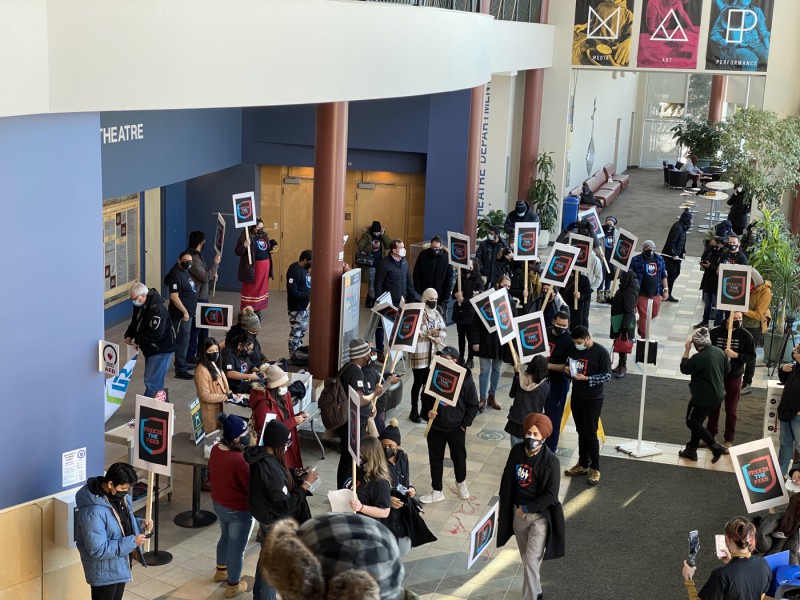
In an interview, Patel explained that he hopes the rally will widely promote URSU’s advocacy on issues affecting international students, including the 20-hour off-campus work limit, the fact that many government-funded jobs and scholarships are only available to domestic students, and the difficulty of getting and maintaining permanent residency as an immigrant. Patel knows these issues intimately – he is an international student living off student loans that will leave him with over $95,000 of debt after he graduates next year.
The university’s administration did not attend the rally, instead posting a statement on their website the day of. “While we may not be financially able to respond in a way that addresses their [students’] specific concerns in this case, we recognize they are expressing the experiences of many international students and we will do our best to mitigate, given our financial capacity,” the statement read.
The statement also noted the university’s projected $16 million shortfall for the 2021-22 fiscal year, and the “significant financial pressures” caused by the COVID-19 pandemic.
The demand from students is clear: freeze tuition for international students in recognition of the economic hardship they face. But the UofR administration’s statement shows few signs that they are ready to meet that demand, or to do anything more than “welcome feedback from students.” So there’s plenty of work for URSU – and other students’ unions across Canada – to do.

